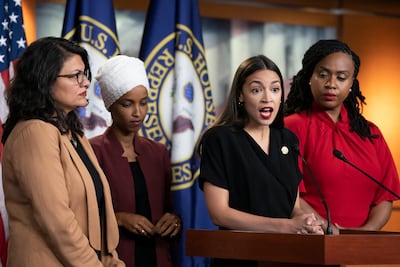Naga Munchetty is a BBC Breakfast host of Indian-Mauritian heritage. One morning in July on the British TV news show, she and co-presenter Dan Walker dedicated part of the programme to discussing a series of tweets posted by US President Donald Trump. In reference to four members of the US House of Representatives – Ilhan Omar, Alexandria Ocasio-Cortez, Rashida Tlaib and Ayanna Pressley – Mr Trump had said they should "go back and help fix the totally broken and crime infested places from which they came". All four parliamentarians happen to be American citizens and women of colour – only Ms Omar was born overseas – and the president's remarks were widely condemned as racist because they drew on the racist trope of telling people to "go home".
BBC Breakfast is a leisurely show in which the hosts and their guests have freewheeling conversations while sitting on sofas. The tone is informal and the hosts engage in lighthearted banter and some commentary. On the day in question, after speaking to a Trump supporter, Walker asked Munchetty to talk about her own experiences. She replied: “Every time I have been told, as a woman of colour, to go back to where I came from, that was embedded in racism. Now I'm not accusing anyone of anything here but you know what certain phrases mean.” On being asked how she felt about Mr Trump’s tweets, Munchetty added: “Absolutely furious.” She pointed out the likelihood that others might feel encouraged to use such language.

The clip of their chat went viral, with the BBC promoting it online. However, the BBC’s executive complaints unit partially upheld a complaint against Munchetty after a viewer opined that she went too far in expressing her opinion and had therefore contravened the company’s impartiality guidelines. The problem, the broadcaster said, was that while she was entitled to give a personal response to the phrase, her comments “went beyond what the guidelines allow for”.
The ruling prompted an avalanche of complaints from dozens of high-profile black actors, comedians and presenters, as well as many BBC staff, while the hashtag #IStandWithNaga trended on Twitter, backed by the likes of Chancellor Sajid Javid and Labour leader Jeremy Corbyn. Earlier this week, the corporation’s director general Lord Anthony Hall overturned the ruling.
This shows the power of the collective voice. There was a public outcry as many felt that silencing a woman of colour for talking about racism was wrong. In an open letter, the 44 high-profile signatories argued “racism is not a valid opinion on which an ‘impartial’ stance can or should be maintained”, adding that to censure Munchetty was a “form of racially discriminatory treatment”.
The chorus of voices also pointed out that not calling out racism and its devastating impact legitimised it as a valid viewpoint. By discussing her personal response to explain the problematic nature of Mr Trump’s tweets, Munchetty was not failing in her job. On the contrary, she was doing the job she was hired to do. It was the organisation that fell short – by being harsh towards her and not towards her white co-host. Both had been cited in the original complaint but only Munchetty was censured for apparently going too far in expressing her opinion.
When people speak out together and stand in solidarity, injustice can quickly be corrected. What the collective voice demonstrated was that the BBC was out of touch. But this was only evident because so many people spoke up – if only to state what should have been obvious, yet needed to be said. The public voice when exercised with such focus has a power that cannot be matched. It harnesses the collective conscience and demonstrates that solidarity is effective. This is a heartening lesson in a world in which it is too easy as an individual to feel disenfranchised and powerless.
As this episode shows, the explicit moral argument against racism has been won but its subtle manifestations in the real world still need to be tackled. When we speak up against it together, we can make an impact – and it can be powerful.
Shelina Janmohamed is the author of Love in a Headscarf and Generation M: Young Muslims Changing the World

